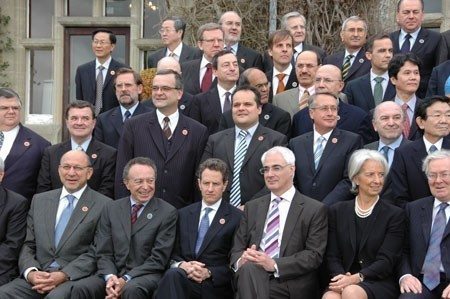
I'm sure you realised this was an April Fool ... or was it?
The Wall Street Journal reports this week that "U.S. and European governments are moving toward a
consensus on taxing large banks to cover the cost of any future bailouts
rather than asking taxpayers to foot the bill, as happened regularly in
past banking crises".
However, in an exclusive report, the Finanser has learnt that the G20 Finance Ministers' negotiations for a global agreement on banking regulations disintegrated dramatically last night.

This was after lengthy talks about a transaction tax caused fundamental disagreements and a major rift between the key economic nations of the world.
The Tobin Tax, or Robin Hood Tax as some call it, is meant to create a fund for future issues in the financial system. In principle, the G20 has agreed that this is the right thing to do and were discussing the level of the tax being 0.01 cents per transaction, no matter the size of the bank transaction.
That’s all fine in principle but, in practice, governments are unable to agree as to its usage.
The German and French authorities have been arguing that the fund is meant to be there to protect citizens and, should another bank collapse occur, to fund future bank bailouts.
Most of the other G20 nations agreed with this – particularly the Canadians who often sided with the French – but several disagreed fundamentally, particularly the British.
Alistair Dawling, on behalf of Gordon Brawn, argued that the tax should be used to create a home fund for the procurement of homes for those challenged by opportunities to get on the housing ladder.

His argument being that individual’s and pension funds’ investments in property had seen major losses during the crisis, and that this area specifically needed help to ensure a strong economy. Equally, in current climate, using the Fund for such purposes is seen to be a strong justification for supporting the housing markets, and therefore the economy, in this time of crisis.
His argument unravelled somewhat however when Christian Lagarde – the French Finance Minister – said that this was a unique situation to markets, such as Britain’s, where home ownership was a major factor, and she asked him to be explicit in how such funds would actually be allocated.
In response, Mr. Dawling said that for Britain the access to such funds would be reserved for those with a legitimate vote in the UK Houses of Parliament, and would be limited to just those members with second homes.
By introducing such a bank fund, Mr Dawling argued that it would overcome the issues created by the banking disaster. Not only has the crisis caused the housing market to collapse but this, combined with the scandal of MPs expenses, has meant that many of the right honourable members have lost a fortune.
The Americans didn’t like this idea.
Tom Geithner believes that any bailout should not be a bailout for the long-term or for a politician. It should be for a banker and a banker only. Therefore, the Americans argued that the Fund should be evaluated at the end of each year, and distributed equally back to the banks based proportionally upon their profitability.
In other words, JPMorgan and Goldman Sachs should be legally entitled to 90% of the Fund each year.
The Chinese objected to this approach and the wicked Western ways of undermining the global financial system. Finance Minister Xie Xoren countered with their approach to the Fund’s usage, which would be based upon a ‘Committee of Worthiness’. The Fund would be reviewed each year by a G20 Committee of Finance Ministers, who would have a discussion of projects and their worthiness. The most worthy global projects would then get their funding from the Fund.
The Americans and British almost bought into this idea, which could have led to an agreement with the Chinese until Xie Xoren black-balled their suggestion that the ‘worthiness’ panel should be chaired by Simon Cowell, with a public vote to determine the winner each year.
Tom Geithner thought this a particularly good idea because it would double the Fund’s value, based upon members of the public being charged a minimum dollar per call, but the Chinese didn’t like the idea of parading their government works in public and so it soon got canned.
President Lala of Brazil then came up with a good idea for an alternative spin on this venture, with the view that, as the financial disaster had been created by ‘white men with blue eyes’, the Fund should be run by ‘brown men with brown eyes’.
This almost succeeded, as Mexico and India came on board having been abstentious to that point, until the whole thing got shot down by Wayne Swan, the Australian Finance Minister, who called it a “shitty idea from a man who was more Gu-Ga than Lu-la”.
This caused a fight to start between Brazilian Finance Minister Guido Mantoga and Mr. Swann, which was only resolved when Russian Finance Minister Alexei Leonidovich Kodrin stepped in. Mr. Kordin managed to break the stranglehold Mr. Mantoga had on Mr. Swann, by kicking Mr. Montega hard in a very sensitive part of the body.
Although this worked, it did not endear Mr. Kodrin to the rest of the Ministers in their search for cooperative global relations.
Luckily the Japanese sorted out the frictions, just in time, by saying that the competition for the Fund should be managed on a secret ballot basis, with each country having a vote as to how the funds would be used.
The ministers all agreed with this idea until Turkish Minister Mehmett Şimmşek reported that the Italian Prime Minister, Silvio Burlusconi, had offered him a million euros to vote for using the Fund to encourage improved sexual relations ... and he didn’t think Mr. Burlusconi meant relations in the workplace.
At this point, Tom Geithner was overheard to whisper ‘f***ing Italians’ which led to another fight starting between Mr. Geithner and Italian Finance Minister Julio Tremonti. Seeing another fight starting gave Guido Mantoga, the Brazilian Finance Minister, a chance to get his own back on the Russian Minister, and so he immediately launched himself at Mr. Kodrin, managing to gorge his fingers into Mr. Kodrin’s eyes.
With this murderous moment, Alistair Dawling immediately hid under the table, the Chinese left and the meeting ended in bedlam.
So much for global harmony.
Of course, the good news is that the banks can continue to practice their methods of investing, remunerating, operating and managing our monies as before.
Plus ca change.
Chris M Skinner
Chris Skinner is best known as an independent commentator on the financial markets through his blog, TheFinanser.com, as author of the bestselling book Digital Bank, and Chair of the European networking forum the Financial Services Club. He has been voted one of the most influential people in banking by The Financial Brand (as well as one of the best blogs), a FinTech Titan (Next Bank), one of the Fintech Leaders you need to follow (City AM, Deluxe and Jax Finance), as well as one of the Top 40 most influential people in financial technology by the Wall Street Journal's Financial News. To learn more click here...

